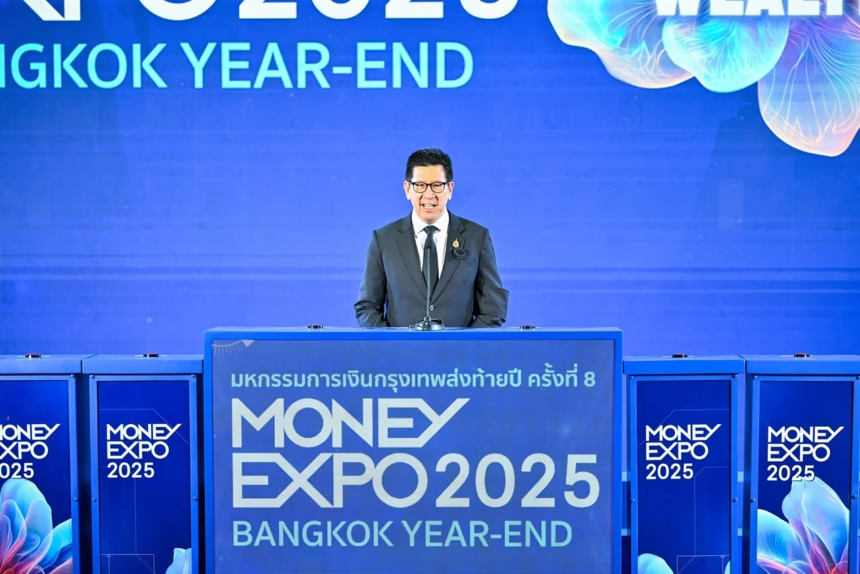BANGKOK — In a crowded exhibition hall on the edge of Bangkok, where banks promoted digital loans and retirees browsed pension products, Finance Minister Ekniti Nitithanprapas set out a stark message that could reshape Thailand’s public finances for the next decade.
Speaking at the Money Expo 2025 Bangkok Year-End on Thursday, he presented a broad fiscal reform plan centred on lifting value-added tax (VAT) back to its legal rate of 10 per cent by 2030. The speech, framed by warnings of a looming “abyss” in state finances, highlighted Thailand’s fragile position between the need to control debt and the desire to support growth.
Ekniti, a long-serving technocrat who took over the ministry in September during political uncertainty, tried to strike a practical note. “We cannot ignore the structural cracks in our fiscal edifice,” he told roughly 5,000 finance professionals, pointing to rising public debt, which now stands near 64 per cent of GDP, and the need for “disciplined revenue mobilisation”.
Under his plan, VAT would rise in stages: first to 8.5 per cent by 2028, then gradually up to 10 per cent by 2030. This would unwind the temporary reduction to 7 per cent, which has been extended until September 2026 to help households after the pandemic. It also signals a shift away from the loose fiscal stance of recent years.
A Wider Reform Package: Tight Spending and New Funding Channels
VAT is only one part of Ekniti’s playbook. His agenda bundles together spending cuts, new investment tools, and tighter rules on long-term state commitments to ease pressure on the budget while keeping room for growth.
He has pledged to trim non-essential expenditure, capping the core budget at no more than 3 per cent of total spending and protecting at least 4 per cent for interest payments. Long-term obligations, which often swell deficits in the background, will be capped at 5 per cent. The goal is a leaner public sector with clearer limits.
To keep public investment flowing, especially into ageing infrastructure, the ministry plans to rely more on off-budget financing. A revamped Thailand Infrastructure Fund will issue bonds and attract private money for roads, rail projects, and flood protection.
At the same time, the government wants to expand public-private partnerships (PPPs) and target 500 billion baht (about $14.5 billion) in PPP projects by 2030. These would range from smart-city improvements in Bangkok to links in the eastern economic corridor.
“These are not mere supplements; they are the scaffolding for fiscal resilience,” Ekniti said, referring to recent cabinet approval of a five-year framework that restricts quasi-fiscal schemes and keeps deficits below 3 per cent of GDP.
The strategy comes at a sensitive moment. The Bank of Thailand expects growth of around 2.5 per cent in 2025, as the country wrestles with weak exports linked to a slowing Chinese economy and domestic weak spots. The direction is in line with many governments that are trying to rebuild revenue as borrowing costs rise, from the UK’s Autumn Budget to Indonesia’s subsidy cuts.
VAT in Focus: From 7% Lifeline to 10% Target
VAT in Thailand is a tax on most goods and services and has sat at a discounted 7 per cent since 2020. The rate was cut during the pandemic to support spending and has since been rolled over several times. That relief, which costs the state about 200 billion baht in lost revenue each year, was meant as a temporary bridge. In the view of the current government, it has turned into an expensive habit.
The return to the statutory 10 per cent rate, last fully applied in 2019, will be gradual to soften the blow. The ministry is considering offset measures such as rebates for low-income households and continued exemptions for key items like rice and medicines.
Many economists back the move in principle. VAT is one of the region’s most effective tools to raise revenue because it is broad and relatively difficult to avoid. A World Bank study estimates that the full VAT hike could generate around 0.5 per cent of GDP in extra revenue by 2030, enough to support welfare programmes without adding fresh debt. The political test will be harder; previous pushes to raise VAT have stalled after public pushback.
Economic Ripple Effects: Tourism, Food Costs, and Everyday Life
Even with a phased rise, higher VAT will filter through most of Thailand’s consumption-heavy economy, where private spending makes up around 55 per cent of GDP.
Tourism, which contributes about 12 per cent of output and supports roughly 20 million jobs, could feel early pressure. Hotel stays, spa visits, tours, and tourist activities are subject to VAT, and the industry predicts room rates could climb 3 to 5 per cent by 2030.
“It is a tax on leisure,” said Apichart Chinakul of the Thai Travel Agents Association, who worries about price-sensitive visitors from China and Europe. Supporters of the plan argue that better transport and city upgrades financed through PPPs may attract higher-spending eco-tourists and help raise tourism income over time.
Food prices are another flashpoint. Costs are already unstable due to weather shocks, and many everyday meals face the full VAT rate. Dishes like som tam and pad thai from street vendors may rise by 5 to 10 baht per serving over several years.
For the roughly 40 per cent of Thais working in informal markets and small stalls, higher input costs and squeezed customers could cut into already thin margins. Research from Kasikorn Research Centre suggests food inflation could increase by about 1.2 per cent by 2028 due to the changes.
Fuel and utilities, which are partly subsidised yet still subject to VAT, are likely to edge up as well. Petrol prices could increase by 2 to 3 baht per litre at the pump, stretching budgets for commuters, especially in car-dependent suburbs and outer provinces.
The impact on household budgets is clear. A typical family of four in Chiang Mai with monthly expenses of 30,000 baht could pay an extra 1,500 to 2,000 baht per year in VAT by the end of the decade. That is close to a week’s worth of groceries. Low-paid workers in industrial zones such as Ayutthaya, who often support relatives in rural areas, may have less spare income for education, healthcare, or savings.
This comes on top of Thailand’s long-running household debt problem. Debt stood at 88.2 per cent of GDP in the first quarter of 2025, down slightly from 89.2 per cent, but still among the highest in Asia. Mortgages and credit card balances dominate official figures, while informal lending in villages and small businesses probably pushes the true ratio past 100 per cent in some estimates.
The Bank of Thailand has flagged concern about non-performing loans, which are around 3 per cent of the total. Officials worry that higher living costs linked to VAT could push vulnerable borrowers into arrears, raising the risk of a broader credit squeeze that recalls the kind of debt spiral seen in Sri Lanka in 2022.
A Risky Bet for Long-Term Fiscal Health
Ekniti’s agenda is ambitious and far from universally accepted. Opposition figures, including senior members of Pheu Thai, criticise a higher VAT rate as unfair, since it falls more heavily on poorer households that spend most of their income.
For the lowest income group, consumption taxes can absorb around 15 per cent of earnings, compared with roughly 5 per cent for richer groups. “Pair it with progressive income tax hikes,” argued former finance minister Jaturon Chaisaeng.
Supporters counter that the government is building in buffers. Plans include using part of the extra VAT revenue to fund debt relief for around 5 million households with smaller debts and to support green projects through the infrastructure fund. The idea is to link tax increases with visible benefits, from cleaner transport to cheaper refinancing for struggling families.
As Thailand prepares to chair ASEAN in 2026, a stronger fiscal base could help attract foreign investment into areas such as semiconductors and renewable energy. Confidence in the country’s public finances may appeal to investors looking for stable production hubs in the region.
Execution, however, will depend on political stability and public patience. The ruling coalition must stay united around potentially unpopular tax hikes, and voters need to feel that the trade-offs are fair. After the speeches at the Money Expo, as attendees exchanged cards over iced lattes, one banker summed it up dryly: “Ekniti is betting the house on prudence. Let us hope the foundations are as solid as he thinks.”














